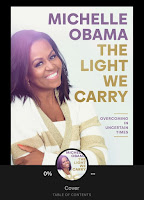The digital copy of Michelle Obama's 'The Light We Carry' (2022) had such a long waiting list on NLB that I forgot about it till the library sent an alert to indicate that the e-book was ready to be borrowed. Okaaaaay. (Reviews here, here, here, and here.)
I read 'Becoming' (2018) because I wanted to read about Michelle Obama's journey in her words. I can't even say if I enjoyed it because it's just learning a little more about someone else's lived experiences. It was an okay read because she mostly writes in her voice to tell her life story, and that is ideal.
'The Light We Carry' can read like a self-improvement guide, well, Michelle Obama's guide to coping with stress and uncertainty. She divides the book into three parts and 10 chapters. The advice is not new or ground-breaking. Which piece of advice is? It's only whether they reach you in a timely manner, and if you feel that they work for you at any point in time in a set of given circumstances and situations. Michelle Obama is simply sharing what has worked for her. Judith Newman at The New York Times wrote this in her book review,
Each chapter is a tool, as Obama puts it, to help keep yourself together. Her thoughts are nuanced and never prescriptive; she tells stories about what has worked for her. In a chapter aptly titled “The Power of Small,” for example, she tells us about how, when the world seems overwhelming, little victories can see us through. (For Obama, it was knitting: “Shaken by the enormity of everything that was happening, I needed my hands to introduce me to what was good, simple and accomplishable.” She taught herself using YouTube.)
In the final Part Three of Chapters Nine and Ten, these are respectively are titled, 'The Armor We Wear' and 'Going High'. Those contain reflections from the White House years, and opinions formulated from difficult campaigns and and tough political battles. She's a lawyer by training, and by no means defenceless, yet as a black woman who has found herself in a powerful political position, she is equally plagued by the discrimination many people of colour face in today's America. Her privilege of education and such doesn't shield her from all these. Her seeming 'elitism' is just that, a facade. Her successes are hard-won.
In Part Two, Chapter Five, she titled it 'My Kitchen Table'. She describes how she views friendships, and how she views her friends and tries her best to treat them fairly, especially those in her inner circle. She explains how "having close friendships has also helped to take the pressure off my marriage." She had many friends during the Princeton years, and she also makes a continuous effort to cultivate new adult friendships.
A Kitchen Table, in general, is never stagnant. Friends will come and go, taking on more or less importance as you move through different phases of life. You may have a small group of friends, or just a few one-on-one friendships. All of that is okay. What matters most is the quality of your relationships. It's good to be discerning about who you trust, who you bring close. With new relationships, I find myself quietly assessing whether I feel safe and whether, inside the context of a budding friendships, I feel seen and appreciated for who I am. With our friends, we are always looking for very simple reassurances that we matter, that our light is recognised and our voice is heard—and we owe our friends the same. I want to say, too, that it's okay to step back from or downsize a difficult friendship. Sometimes we have to let certain friends go, or at least diminish our reliance on them.Not all of the people who sit at my Kitchen Table know one another well; some have never even met. But collectively, they are powerful. I lean on each individual at different times and in different ways. Which is another thing worth recognizing about friendship: No one person, no one relationship, will fulfil your every need. Not every friend can offer you safety or support on every day. Not everyone can, or will, show up precisely when or how you need them to. And this is why it's good to always continue making room at your table, to keep yourself open to gathering more friends. You will never not need them, and you will never stop learning from them. I can promise you that.


No comments:
Post a Comment